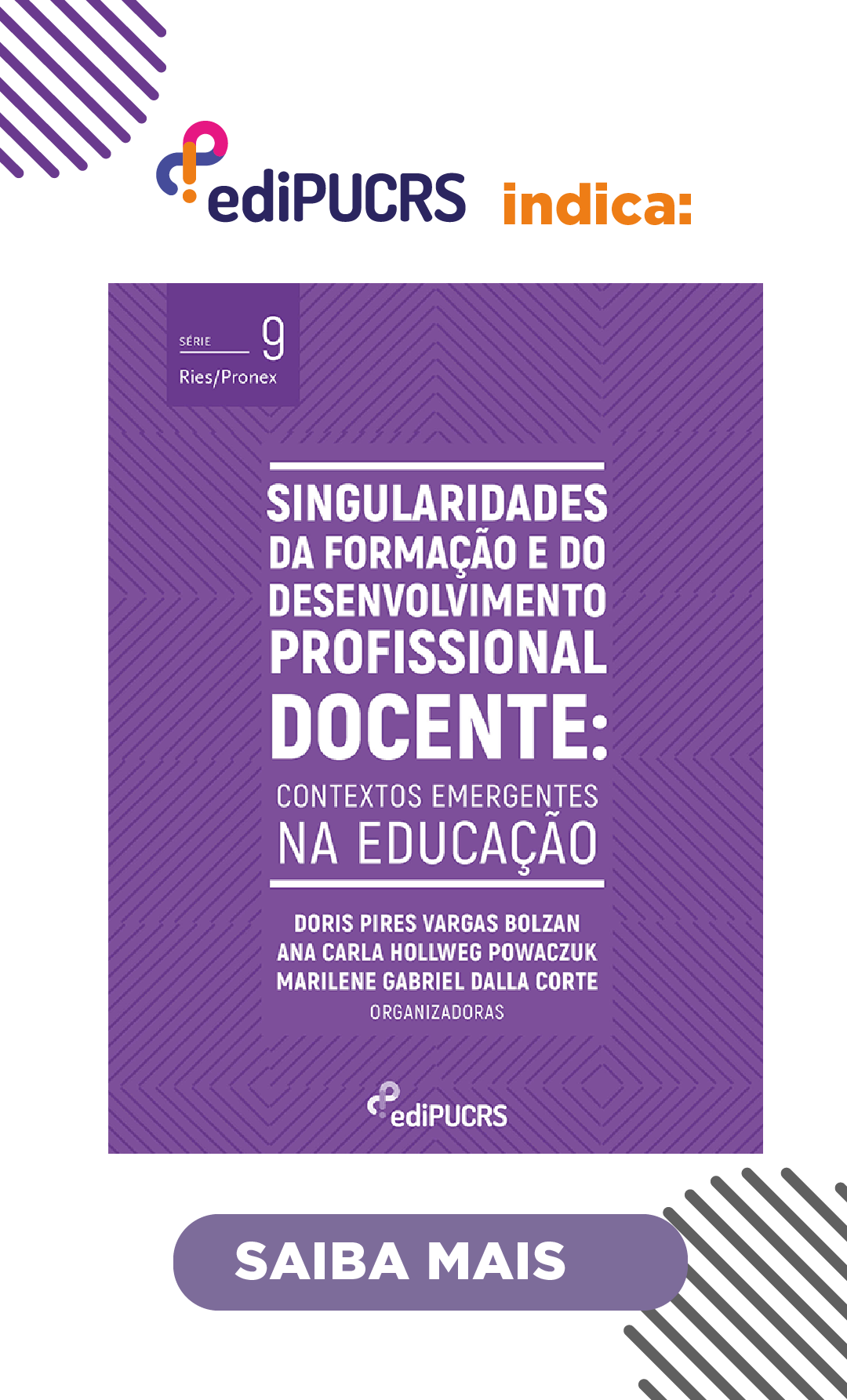The university while a (not)place: reflections on factors of engagement and student placement
DOI:
https://doi.org/10.15448/2179-8435.2018.2.33128Keywords:
Engagement, Permanence, University, Place, Not place.Abstract
Higher education institutions, in a scenario of increasingly competitive competitiveness, currently share the same challenge: in addition to attracting new students, how to maintain them? How to engage them in daily life so that they consider the University a place of permanence and not only a (not)place of passage (AUGÉ, 2010, 2012)? We chose the anthropological perspective on places and non-places proposed by Augé to provide reflections on student engagement, as a central dimension in the management of permanence and fidelization in Higher Education. Augé defines the places as spaces that are intended identities, historical and relational. Environments endowed with value, feelings, experience, senses, of links. Non-places, on the other hand, are spaces, usually of circulation, where they do not subscribe lasting relationships and relationships are based on contracts, with prescriptive, imperative, which do not generate links (AUGÉ 2010, 2012). We believe that the strategies of engagement of the HEIs are configured in fundamental dimensions to make the academic environment anthropological places, relational, full of meaning for their students, developing not only their cognitive skills, but generating meaningful and relevant experiences and learning. Such involvement, in turn, positively influence the academic performance of the student (GUERREIRO-CASANOVA, POLYDORO, 2010; ASTIN 1977, 1993), also contributes to the permanence of the student and the consolidation of his trajectory (TINTO, 2000), impacting on institutional sustainability. According to Augé (2012, page 87) "Just as anthropological places create an organic social, non-places create solitary tension." In this perspective, the place is built amid sensitivities and fragments of the subject's identity and / or dimension which is there. A staged dimension means to say that there is a bond between it and the place, a connection that makes it part, a sense of belonging. The purpose of the article is to reflections on student engagement at a confessional university in Rio Grande do Sul as a place. Methodologically, this is a bibliographical study from the reference authors, already mentioned, complemented with documentary analysis.
Downloads
References
ASTIN, Alexander W. Student involvement: a developmental theory for higher education. Journal of College Student Development, v. 40, n. 5, p. 518-528, set./out. 1999.
AUGÉ, Marc. Não-lugares. Introdução a uma antropologia da supermodernidade. Campinas, São Paulo: Papirus, 2012a.
AUGÉ, Marc. Para onde foi o futuro? Campinas: Papirus, 2012b.
AUGÉ, Marc. Por uma antropologia da mobilidade. Maceió: Editora Unesp/UFAL, 2010.
BAITELLO, N. A era da iconofagia: ensaios de comunicação e cultura. São Paulo: Hacker Editores. 2008.
BARKLEY, Elizabeth F. Student Engagement Techniques: a Handbook for College Faculty. Jossey-Bass. 2016.
BRAULT-LABBÉ, Anne; DUBÉ, Lise. Mieux comprendre l’engagement psychologique revue théorique et proposition d’un modèle intégratif. Les Cahiers Internationaux de Psychologie Sociale, n. 81, p. 115-131, 2009.
CAMPBELL, Corbin; CABRERA, Alberto. How sound is NSSE?: Investigating the psychometric properties of NSSE at a public, researchextensive institution. The Review of Higher Education, Maryland, USA, v. 35, n. 1, p. 77-103, 2011.
COSTA; Vitória. Engajamento acadêmico: aportes para os processos de avaliação da educação. superior XII Congresso Nacional de Educação. PUCPR, 2017. Disponível em: <http://educere.bruc.com.br/arquivo/pdf2017/26956_13785.pdf>. Acesso em: maio 2018.
CASTROGIOVANNI, Antonio. Lugar, no-lugar y entre-lugares. Los ángulos del espacio turístico. Estudios y Perspectivas en Turismo, v. 16, p. 05-25, 2007. Guerreiro-Casanova, D. C.; Polydoro , S. A. J. Autoeficácia na formação superior: percepções durante o primeiro ano de graduação. Psicologia: Ciência e Profissão, 31(1), 50-65, 2011. DOI: http://dx.doi.org/10.1590/S1414-98932011000100006
HARPER, Shaun; QUAYE, Stephen John (Ed.). Participación de los estudiantes en la educación superior: perspectivas teóricas y enfoques prácticos para poblaciones diversas. Nueva York y Londres: Routledge, 2014.
INEP.GOv.br-http://portal.mec.gov.br/ultimas-noticias/212-educacao superior-1690610854/40111. Acesso em: maio 2018.
MARTI, Nathan. Dimension of student engagement in american community colleges: using the community colleges: using the community colleges student report in research and practice. Community College Journal of Research and Practice, USA, n. 33, p. 1-24, 2011.
MARTINS, Letícia Martins de; RIBEIRO, José Luis Duarte. Engajamento do estudante no ensino superior como indicador de avaliação. Avaliação, Campinas; Sorocaba, SP, v. 22, n. 1, p. 223-247, mar. 2017.
MCCORMICK, Alexander; KINZIE, Jillian; GONYEA, Robert. Compromiso de los estudiantes: unir la investigación y la práctica para mejorar la calidad de la educación de pregrado. Educación superior. Springer Países Bajos, 2013. p. 4792.
MUMBY, Dennis K. Reflexões críticas sobre comunicação e humanização nas organizações. In: KUNSCH, Margarida M. K. A Comunicação como fator de humanização das organizações. São Caetano: Difusão, 2010.
KUH, George. Participación de los estudiantes en el primer año de la universidad. Desafiando y apoyando al estudiante de primer año: un manual para mejorar el primer año de la universidad, Nueva Jersey, EE. UU. 2009.
PDI-PUCRS. Plano de Desenvolvimento Institucional PUCRS 2016-2022. Porto Alegre, 2016.
RIVIÈRE, Pichon-Enrique. Teoria do vínculo. São Paulo: Martins Fontes,1998.
RS-PUCRS. Relatório Social da PUCRS 2016. Porto Alegre, 2017. Disponível em: <http://ebooks.pucrs.br/edipucrs/relatoriosocial/2016/#!/br/home>. Acesso em: 20 set. 2018.
TROWLER, Vicki. Student engagement literature review. 2010. Disponível em: < https://www.heacademy.ac.uk/system/files/studentengagementliteraturereview_1.pdf>. Acesso em: ago. 2018.
TUAN, Yi-Fu. Espaço e Lugar: a perspectiva da experiência. São Paulo: Eduel, 2013.
ZEPKE, Nick; LEACH, Linda; BUTLER, Philippa. Noninstitutional influences and student perceptions of success. Studies in Higher Education, v. 36, n. 2, p. 227-242, 2011.
ZIMMERMANN, David E. Os quatro vínculos: Amor, ódio, conhecimento, reconhecimento na psicanálise e em nossas vidas. Porto Alegre: Artmed, 2010.
Downloads
Published
How to Cite
Issue
Section
License
Copyright
The submission of originals to Educação Por Escrito implies the transfer by the authors of the right for publication. Authors retain copyright and grant the journal right of first publication. If the authors wish to include the same data into another publication, they must cite Educação Por Escrito as the site of original publication.
Creative Commons License
Except where otherwise specified, material published in this journal is licensed under a Creative Commons Attribution 4.0 International license, which allows unrestricted use, distribution and reproduction in any medium, provided the original publication is correctly cited.





